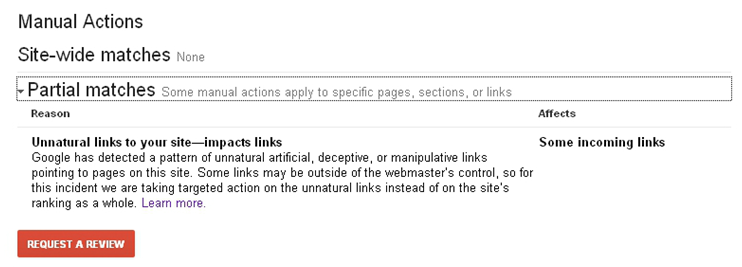
- The Importance Of Rank Tracking Local Keywords In 2018 - June 5, 2018
- How to Spot Opportunities from your Competitors’ Backlinks - July 19, 2017
- Why You Should Monitor Your Brand Daily - May 26, 2017
Site rankings give a website credibility. When you’re on the first page of Google, that means you’re doing something right, because the search engine trusts you enough to recommend you to its millions of subscribers. That “trust,” in terms of your position in the rankings, can easily be stripped away, though.
Some of the reasons you drop a rank or two may be because of something you did, but it also could be beyond your control.
Here are 10 reasons your Google rankings dropped significantly, and how to deal with them:
1. There was a Google Update
Google changes their algorithm every so often, leaving SEO agencies to wonder what they’ll do next.
@kdsharmas we make so many changes that there’s bound to be 1+ on that day too. I’m sure @rustybrick makes 1+ changes or posts/day too.
— John ☆.o(≧▽≦)o.☆ (@JohnMu) February 14, 2017
This is one thing you can never be prepared enough for, but you know it will happen eventually. SEO experts recommend a digital marketing strategy that’s as organic as possible.
2. On-site Issues
This pertains to dead links and redirects that you may not have fixed before launching the site. Any good SEO will check for dead or inaccessible pages. Basic knowledge of Google Search Console will help you fix this, as the dashboard should tell you if there are any problems with your current site set-up.
Here’s an example taken from a website’s Search Console dashboard:

3. Your Site Lost Links
Losing one or two inbound links would be normal, as some sites linking to your website might be undergoing some changes. If you lose a significant number of links in a short span of time, this might indicate that those links were unnatural. And Google hates unnatural links.
A huge drop in the number of inbound links may cause a drastic Google rankings drop, which may trigger the loss of even more links. If this continues, you may get penalized by Google. Use Siteoscope for any indication that your site is losing links.

4. You Have New Links
Link loss may be a red flag for Google, but gaining too many links quickly is another suspicious activity. Google might consider this as link spam and penalize your site for unnatural links. The problem here is that the link gain may be due to viral content, so always check if the sources of those links are trustworthy in the eyes of Google.
5. You Received Site Penalties
You might have received manual or algorithm penalties; both of which you can see from Search Console. Look under the “Manual Actions” section to see if Google wants you to resolve any issues. 
After resolving the cause of the penalties, it might take a few more days to see your ranking normalize.
6. Your Target Audience Searches Differently
There has been a significant change in the way SEO works, primarily because of the way people search. In the past, it was acceptable to just pad your pages with keywords – from the URL to the title, headers, and content.
Today, user behavior indicates queries contain longer keyword phrases. To adapt to that shift in user behavior, make sure you target the right keywords. If you don’t, your website may be pushed back to a different page, as Google gives the first page to fresh content that attracts more visitors.
7. Your CTR Dropped
Though this doesn’t usually have a big effect on your ranking, for competitive keywords, Google will not hesitate to push you back a couple of notches if people seem to be more interested in other websites. Check your CTR over the last 90 days for any significant dents, so your SEO can pick up the possible problems and work on them before a significant ranking loss.
8. You Have Problems with Your Robot.txt File
When users search on Google, the search engine often corrects misspelled words to display relevant results. This isn’t the same when you have spelling errors on your robot.txt file, as this may direct spiderbots to the wrong place. The worst part is you might not easily find where the problem stems from. Be thorough in checking your robot.txt file before you submit the site to Google to avoid problems like this.
9. Visitors are Leaving Your Website Prematurely
When you have a high bounce rate, this tells Google that your content is not helpful or relevant to what users are searching for. This may prompt them to bump you lower so that they can rank a site with more valuable content.
When you log into Siteoscope, go to Analytics > Behavior > Landing Pages. Scroll below and you’ll find the metrics for each pages, including the Average Session Duration for every page. Note the pages that have a short average session duration, like the example below:

There is no easy fix for this. Work on the quality of your content and make sure to add relevant links to guide visitors when they navigate the website.
10. Your Competitors Rank Higher
Sometimes you lose your ranking not because you did anything wrong, but because your competitors are doing something right. They gain a higher ranking and the shift could put you a little lower. It’s hard not to be affected by such a movement and the only thing you can really do is outsmart their SEO by being better. Offer better services, update your web copy to reflect a more targeted page, and make sure your graphics are loading quickly.
The key to keeping your ranking — or improving it — is to always monitor site activity. Siteoscope provides you with the tool to do just that. If you’re proactive about keeping your site healthy SEO-wise, you don’t have to worry about a thing.




